人教新目标(Go for it)版九年级全册 Unit 2 I think that mooncakes are delicious! Section A (1a-2d)课件 (共32张PPT)
文档属性
| 名称 | 人教新目标(Go for it)版九年级全册 Unit 2 I think that mooncakes are delicious! Section A (1a-2d)课件 (共32张PPT) | 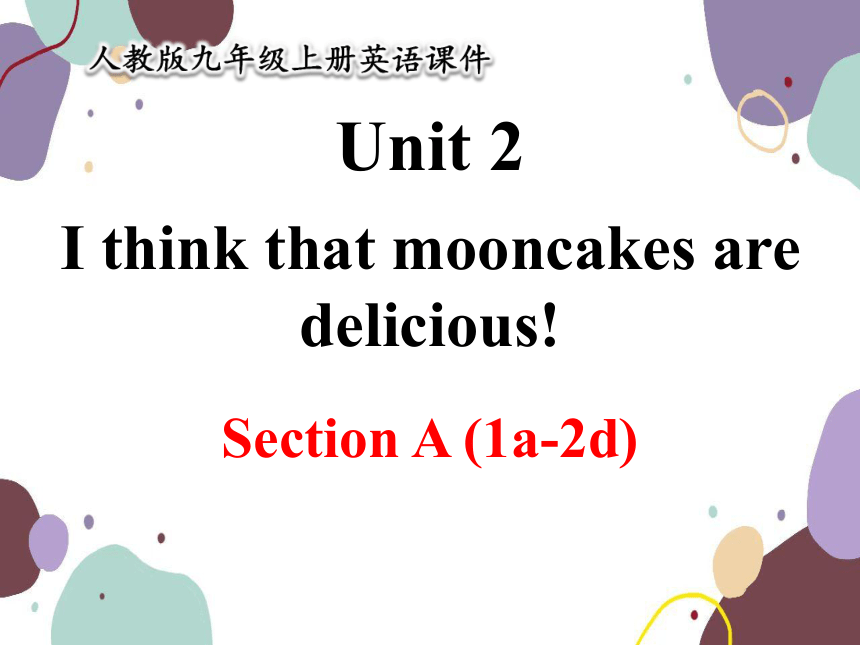 | |
| 格式 | pptx | ||
| 文件大小 | 33.0MB | ||
| 资源类型 | 教案 | ||
| 版本资源 | 人教新目标(Go for it)版 | ||
| 科目 | 英语 | ||
| 更新时间 | 2023-07-11 19:53:15 | ||
图片预览

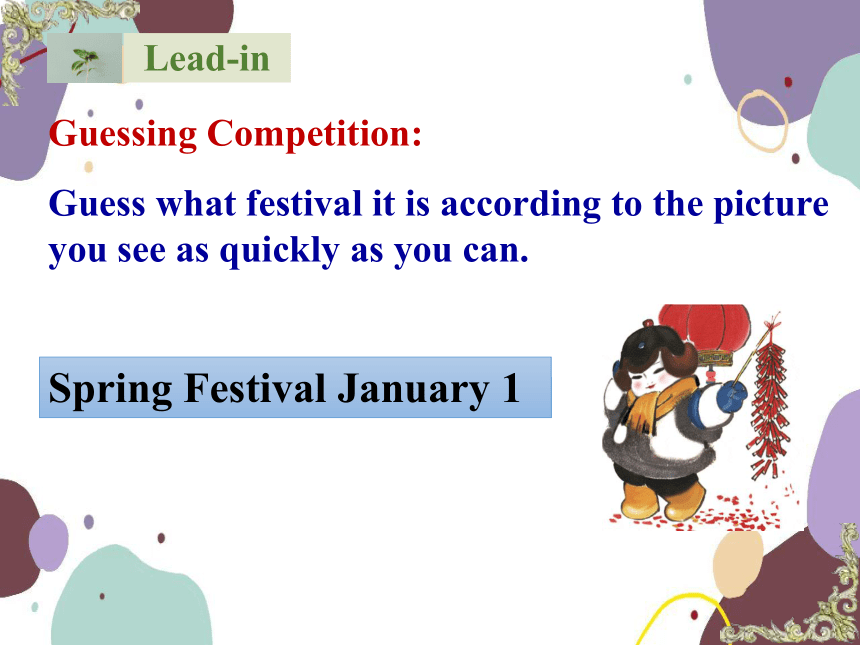
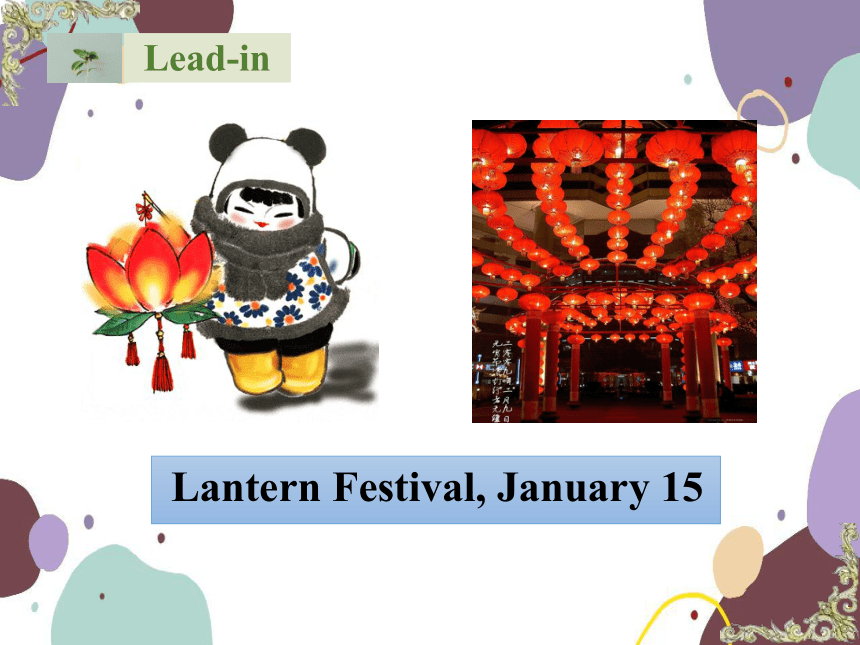
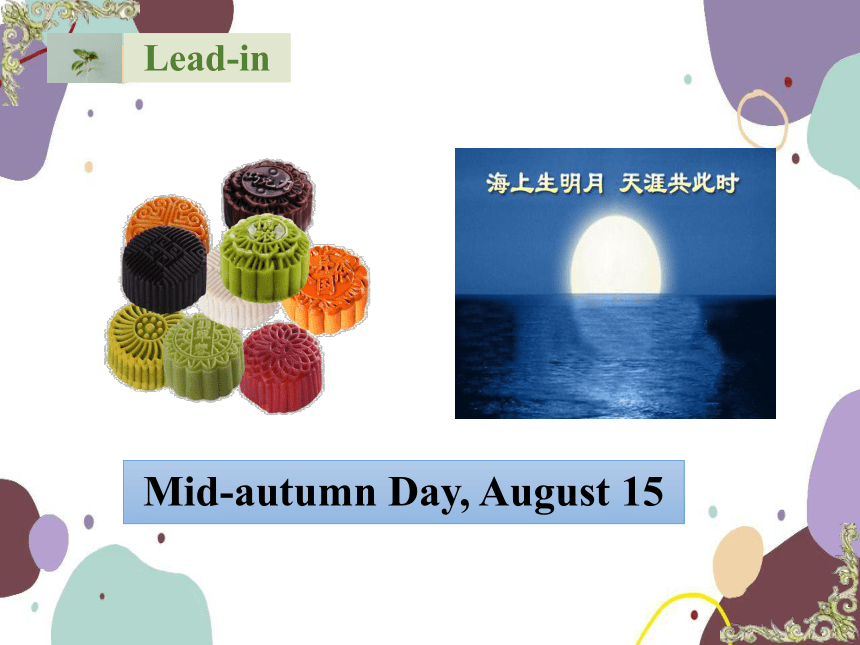
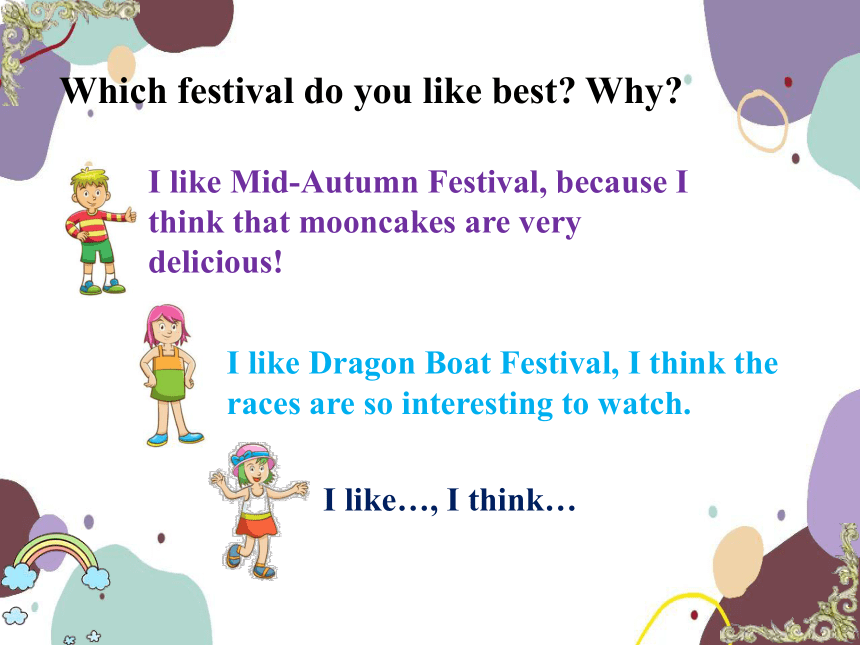
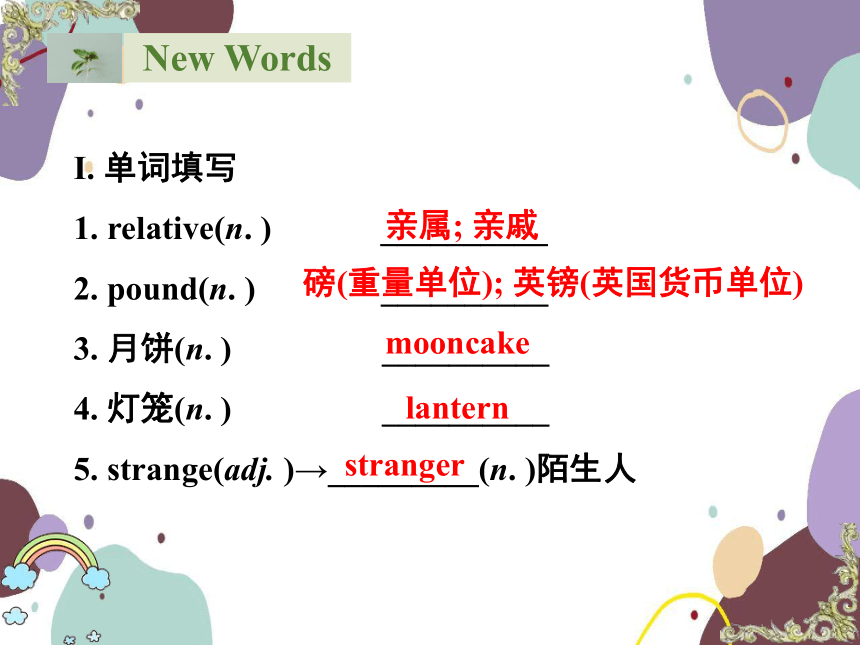
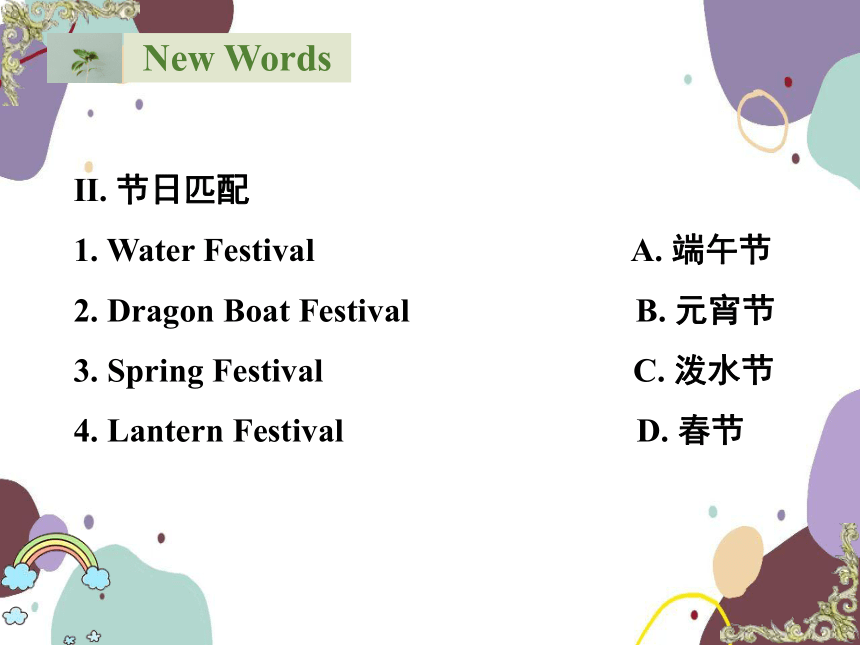
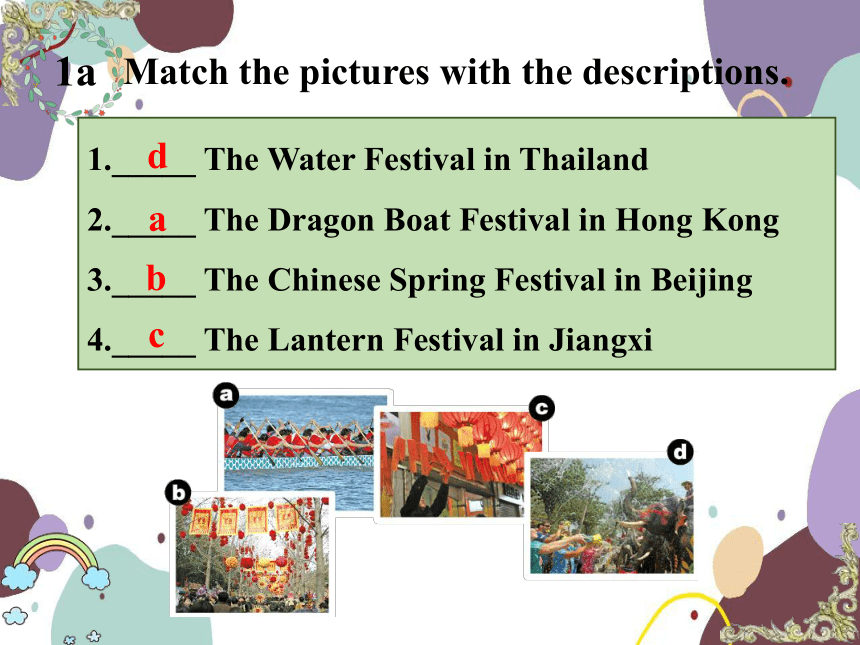
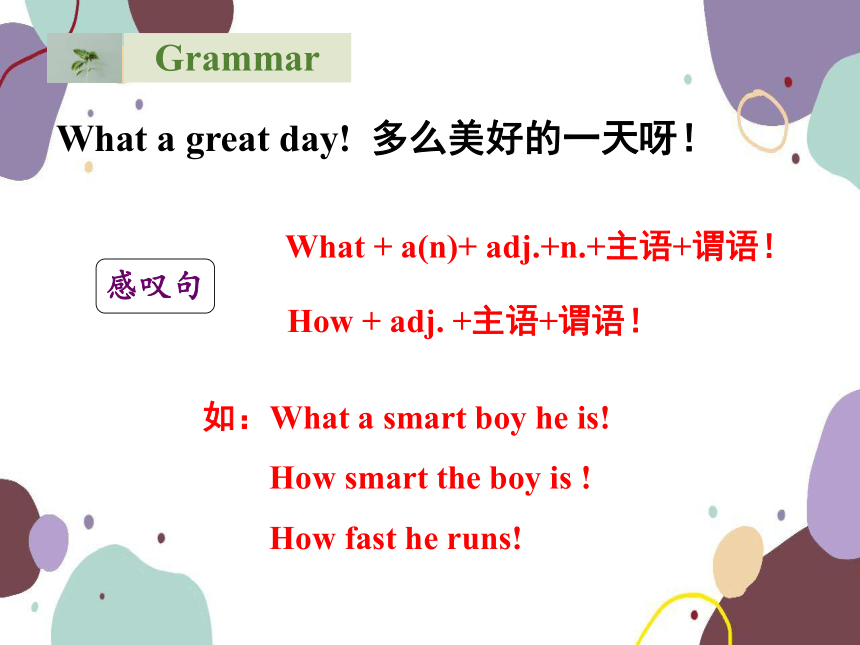
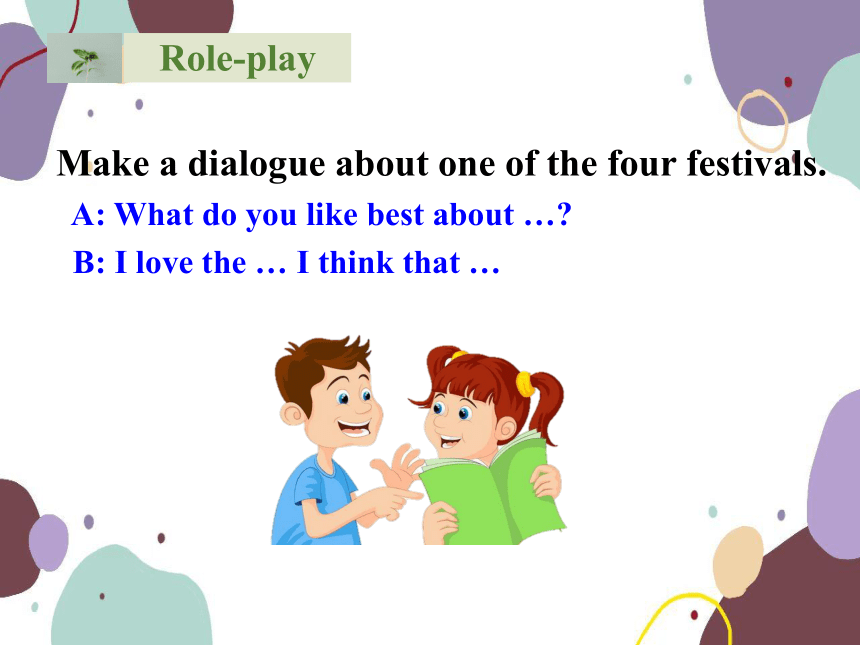
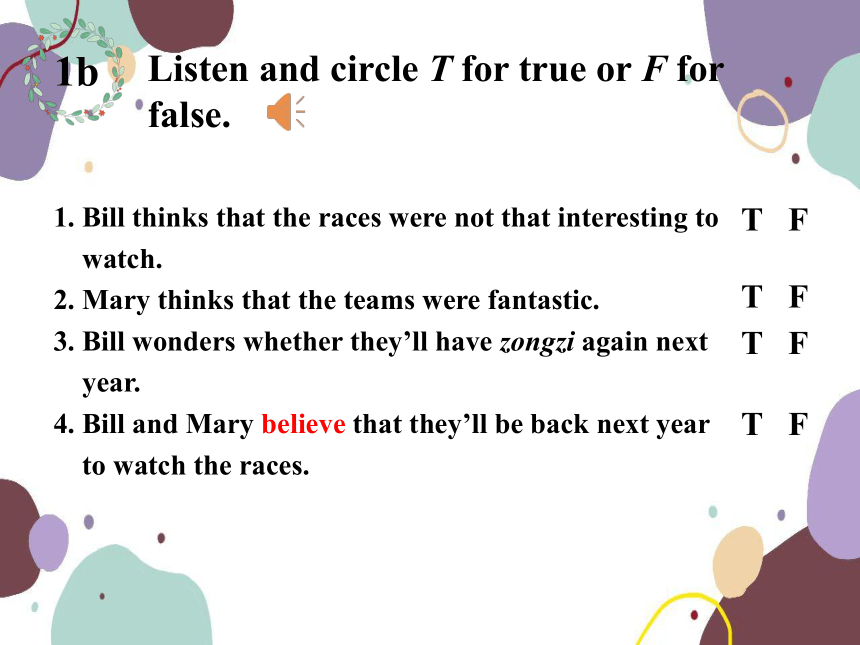
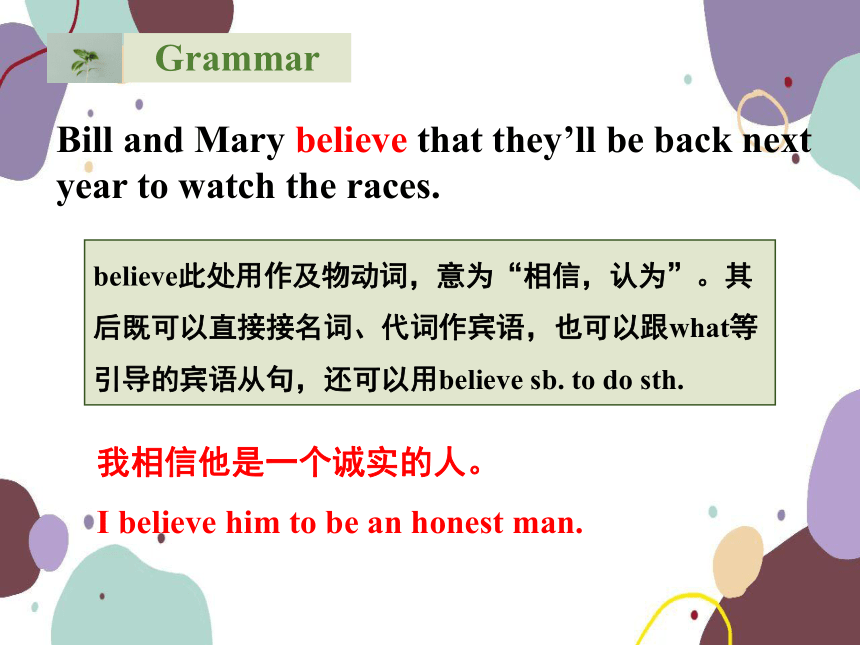
文档简介
(共32张PPT)
人教版九年级上册英语课件
Section A (1a-2d)
Unit 2
I think that mooncakes are delicious!
Lead-in
Guessing Competition:
Guess what festival it is according to the picture
you see as quickly as you can.
Spring Festival January 1
Lantern Festival, January 15
Lead-in
Lead-in
Mid-autumn Day, August 15
Which festival do you like best Why
I like Mid-Autumn Festival, because I think that mooncakes are very delicious!
I like Dragon Boat Festival, I think the races are so interesting to watch.
I like…, I think…
New Words
Ⅰ. 单词填写
1. relative(n. ) __________
2. pound(n. ) __________
3. 月饼(n. ) __________
4. 灯笼(n. ) __________
5. strange(adj. )→_________(n. )陌生人
亲属; 亲戚
磅(重量单位); 英镑(英国货币单位)
mooncake
lantern
stranger
Ⅱ. 节日匹配
1. Water Festival A. 端午节
2. Dragon Boat Festival B. 元宵节
3. Spring Festival C. 泼水节
4. Lantern Festival D. 春节
New Words
1a
Match the pictures with the descriptions.
_____ The Water Festival in Thailand
_____ The Dragon Boat Festival in Hong Kong
_____ The Chinese Spring Festival in Beijing
_____ The Lantern Festival in Jiangxi
b
a
c
d
What a great day! 多么美好的一天呀!
如:What a smart boy he is!
How smart the boy is !
How fast he runs!
感叹句
What + a(n)+ adj.+n.+主语+谓语!
How + adj. +主语+谓语!
Grammar
Make a dialogue about one of the four festivals.
A: What do you like best about …
B: I love the … I think that …
Role-play
Listen and circle T for true or F for false.
1. Bill thinks that the races were not that interesting to
watch.
2. Mary thinks that the teams were fantastic.
3. Bill wonders whether they’ll have zongzi again next
year.
4. Bill and Mary believe that they’ll be back next year
to watch the races.
T F
T F
T F
T F
1b
Bill and Mary believe that they’ll be back next year to watch the races.
believe此处用作及物动词,意为“相信,认为”。其后既可以直接接名词、代词作宾语,也可以跟what等引导的宾语从句,还可以用believe sb. to do sth.
我相信他是一个诚实的人。
I believe him to be an honest man.
Grammar
Talk about the festival in 1a.
I love the races.
I think that they’re
fun to watch.
What do you like
best about the Dragon
Boat Festival
1c
Listen to the conversation between Wu Ming and Harry and circle the correct words in the sentences.
1. Wu Ming and Harry are cousins/strangers/friends.
Wu Ming went to Singapore/Hong Kong/Macao for his vacation.
3. Wu Ming visited his relatives/friends/classmates.
4. Wu Ming liked eating out/shopping/the Dragon Boat Festival best.
2a
Wu Ming went to Singapore/Hong Kong/Macao for his vacation.
go to …for a/one’s vacation 意为“去…度假”
【妙辨异同】
go for a vacation 去度假 度假还没有开始,在计划中
go on vacation 在度假 度假正在进行
Grammar
Wu Ming did a lot of fun activities, but there were also downsides. Listen again and fill in the chart.
He put on five pounds.
He spent so much money.
It’s quite hot.
2b
Role-play conversations between Wu Ming and Harry. Use the information in 2a and 2b or make your own conversation.
A: What did you do on your vacation
B: I visited my cousins. I think that we ate five meals a day! I’ve put on five pounds!
A: I guess the food was delicious, right
2c
Role-play the conversation.
Clara: Guess what I’m going to Chiang Mai in two weeks.
Ben: Wow, sounds like fun! But I believe that April is the hottest month of the year there.
Clara: Yes, that’s true. But there’s a water festival
from April 13th to 15th.
Ben: I wonder if it’s similar to the Water Festival
of the Dai people in Yunnan Province.
Clara: Yes, I think so. This is the time of the Thai New Year.
People go on the streets to throw water at each other.
Ben: Cool! But why do they do that
Clara: Because the new year is a time for cleaning and washing
away bad things. Then you’ll have good luck in the new
year.
2d
I’ve put on five pounds!
我都胖了五镑了!
put on意为“增加(体重);发胖”。
I can eat what I want but I never put on weight.
我能想吃什么就吃什么,但是从来不发胖。
put on的其他用法
“穿上;戴上”She put on her coat and went out.
“上演;举办” We’ll put on an English play.
Grammar
1. I’m going to Chiang Mai in two weeks.
根据语境,in two weeks在这句话里的意思是 “两周之后” 。
He'll be back in two weeks.
他两周后回来。
“in+一段时间”和将来时连用,表示“在某段时间之后”。
I finished my homework in 2 hours.
我两小时内做完了功课。
Grammar
2. Sounds like fun. 听起来很有趣。
省略了it这个形式主语,完整的句子是:It sounds like fun.
sound like 听起来像
It sounds like a nice room. Can we take a look at it
听起来房间不错,我们能看一看房间吗
Their love story sounds like a fairy tale.
他们的爱情故事听起来像童话。
Grammar
感官动词 + like
feel like 摸起来像 smell like 闻起来像
look like 看起来像 taste like 尝起来像
Grammar
3. I wonder if it’s similar to …
similar to 跟 ... 类似; 与 ... 同样的
My problems are very similar to yours.
我的问题与你的差不多。
His dress is very similar to mine in colour.
他衣服的颜色和我衣服的颜色很相似。
be similar to 的反义短语是be different from … (与……不同)
Grammar
On my visit to Australia, I feel Australians are similar _____ us in many ways.
A. with B. in C. to D. at
— Can you tell the differences between these two pictures
— Differences Oh, no. They look quite ______.
A. different B. similar
C. strange D. interesting
C
B
Grammar
①—I wonder ____ you would like to go to the concert with me tonight.
—Oh, I’d love to.
A. when B. that C. if D. why
②I don’t know ____ or not he should enter the race.
A. if B. that C. what D. whether
③—Let’s go to the community if it ____ tomorrow.
—But nobody knows if it ____ tomorrow.
A. won’t rain; rains B. doesn’t rain; rains
C. doesn’t rain; will rain D. won’t rain; will rain
Exercise
Ⅰ. 从方框中选词并用其适当形式填空
cousin, strange, watch, cold, put on
1. I don’t know the man. He is a________ to me.
2. Bob is Jim’s uncle’s son, so Bob and Jim are________ .
3. He has_______ several pounds these days, so he wants to lose weight.
4. They said that they enjoyed________ the dragon boat races.
5. I think winter is the________ season of the year in Harbin.
stranger
cousins
put on
watching
coldest
Exercise
The Dragon Boat Festival, also called the Duanwu Festival, is celebrated on the fifth day of the fifth month according to the Chinese calendar. For thousands of years, the festival has been marked by eating zong zi and racing dragon boats.
The festival is best known for its dragon-boat races, especially in the southern provinces where there are many rivers and lakes. This Regatta (赛舟会) is given honour to the memory of the death of Qu Yuan.
课外拓展
The Water Festival is the New Year's celebrations that take place in Southeast Asian countries such as Burma, Cambodia, Laos, and Thailand as well as Yunnan, China.
It is called the “Water Festival” by Westerners because people splash / pour water at one another as part of the cleansing ritual (仪式) to welcome the new year. The act of pouring water is also a show of blessings and good wishes. It is believed that on this Water Festival, everything old must be thrown away, or it will bring the owner bad luck.
The Lantern Festival falls on the 15th day of the 1st lunar month, usually in February or March in the Gregorian calendar. As early as the Western Han Dynasty (206 BC-AD 25), it had become a festival with great significance. Today's important activity is watching lanterns. Lanterns of various shapes and sizes are hung in the streets, attracting countless visitors. “Guessing lantern riddles” is an essential part of the Festival.
The Spring Festival is the most important festival for Chinese people and is when all family members get together, just like Christmas in the West. All people living away from home go back. The Spring Festival originated in the Shang Dynasty
(c. 1600 BC-c. 1100 BC) from the people's sacrifice (献祭) to gods and ancestors at the end of an old year and the beginning
of a new one.
书面作业 (Writing work)
(1)默写所学的新单词
(2) 完成学生用书的相关作业
Homework
谢谢观看
人教版九年级上册英语课件
Section A (1a-2d)
Unit 2
I think that mooncakes are delicious!
Lead-in
Guessing Competition:
Guess what festival it is according to the picture
you see as quickly as you can.
Spring Festival January 1
Lantern Festival, January 15
Lead-in
Lead-in
Mid-autumn Day, August 15
Which festival do you like best Why
I like Mid-Autumn Festival, because I think that mooncakes are very delicious!
I like Dragon Boat Festival, I think the races are so interesting to watch.
I like…, I think…
New Words
Ⅰ. 单词填写
1. relative(n. ) __________
2. pound(n. ) __________
3. 月饼(n. ) __________
4. 灯笼(n. ) __________
5. strange(adj. )→_________(n. )陌生人
亲属; 亲戚
磅(重量单位); 英镑(英国货币单位)
mooncake
lantern
stranger
Ⅱ. 节日匹配
1. Water Festival A. 端午节
2. Dragon Boat Festival B. 元宵节
3. Spring Festival C. 泼水节
4. Lantern Festival D. 春节
New Words
1a
Match the pictures with the descriptions.
_____ The Water Festival in Thailand
_____ The Dragon Boat Festival in Hong Kong
_____ The Chinese Spring Festival in Beijing
_____ The Lantern Festival in Jiangxi
b
a
c
d
What a great day! 多么美好的一天呀!
如:What a smart boy he is!
How smart the boy is !
How fast he runs!
感叹句
What + a(n)+ adj.+n.+主语+谓语!
How + adj. +主语+谓语!
Grammar
Make a dialogue about one of the four festivals.
A: What do you like best about …
B: I love the … I think that …
Role-play
Listen and circle T for true or F for false.
1. Bill thinks that the races were not that interesting to
watch.
2. Mary thinks that the teams were fantastic.
3. Bill wonders whether they’ll have zongzi again next
year.
4. Bill and Mary believe that they’ll be back next year
to watch the races.
T F
T F
T F
T F
1b
Bill and Mary believe that they’ll be back next year to watch the races.
believe此处用作及物动词,意为“相信,认为”。其后既可以直接接名词、代词作宾语,也可以跟what等引导的宾语从句,还可以用believe sb. to do sth.
我相信他是一个诚实的人。
I believe him to be an honest man.
Grammar
Talk about the festival in 1a.
I love the races.
I think that they’re
fun to watch.
What do you like
best about the Dragon
Boat Festival
1c
Listen to the conversation between Wu Ming and Harry and circle the correct words in the sentences.
1. Wu Ming and Harry are cousins/strangers/friends.
Wu Ming went to Singapore/Hong Kong/Macao for his vacation.
3. Wu Ming visited his relatives/friends/classmates.
4. Wu Ming liked eating out/shopping/the Dragon Boat Festival best.
2a
Wu Ming went to Singapore/Hong Kong/Macao for his vacation.
go to …for a/one’s vacation 意为“去…度假”
【妙辨异同】
go for a vacation 去度假 度假还没有开始,在计划中
go on vacation 在度假 度假正在进行
Grammar
Wu Ming did a lot of fun activities, but there were also downsides. Listen again and fill in the chart.
He put on five pounds.
He spent so much money.
It’s quite hot.
2b
Role-play conversations between Wu Ming and Harry. Use the information in 2a and 2b or make your own conversation.
A: What did you do on your vacation
B: I visited my cousins. I think that we ate five meals a day! I’ve put on five pounds!
A: I guess the food was delicious, right
2c
Role-play the conversation.
Clara: Guess what I’m going to Chiang Mai in two weeks.
Ben: Wow, sounds like fun! But I believe that April is the hottest month of the year there.
Clara: Yes, that’s true. But there’s a water festival
from April 13th to 15th.
Ben: I wonder if it’s similar to the Water Festival
of the Dai people in Yunnan Province.
Clara: Yes, I think so. This is the time of the Thai New Year.
People go on the streets to throw water at each other.
Ben: Cool! But why do they do that
Clara: Because the new year is a time for cleaning and washing
away bad things. Then you’ll have good luck in the new
year.
2d
I’ve put on five pounds!
我都胖了五镑了!
put on意为“增加(体重);发胖”。
I can eat what I want but I never put on weight.
我能想吃什么就吃什么,但是从来不发胖。
put on的其他用法
“穿上;戴上”She put on her coat and went out.
“上演;举办” We’ll put on an English play.
Grammar
1. I’m going to Chiang Mai in two weeks.
根据语境,in two weeks在这句话里的意思是 “两周之后” 。
He'll be back in two weeks.
他两周后回来。
“in+一段时间”和将来时连用,表示“在某段时间之后”。
I finished my homework in 2 hours.
我两小时内做完了功课。
Grammar
2. Sounds like fun. 听起来很有趣。
省略了it这个形式主语,完整的句子是:It sounds like fun.
sound like 听起来像
It sounds like a nice room. Can we take a look at it
听起来房间不错,我们能看一看房间吗
Their love story sounds like a fairy tale.
他们的爱情故事听起来像童话。
Grammar
感官动词 + like
feel like 摸起来像 smell like 闻起来像
look like 看起来像 taste like 尝起来像
Grammar
3. I wonder if it’s similar to …
similar to 跟 ... 类似; 与 ... 同样的
My problems are very similar to yours.
我的问题与你的差不多。
His dress is very similar to mine in colour.
他衣服的颜色和我衣服的颜色很相似。
be similar to 的反义短语是be different from … (与……不同)
Grammar
On my visit to Australia, I feel Australians are similar _____ us in many ways.
A. with B. in C. to D. at
— Can you tell the differences between these two pictures
— Differences Oh, no. They look quite ______.
A. different B. similar
C. strange D. interesting
C
B
Grammar
①—I wonder ____ you would like to go to the concert with me tonight.
—Oh, I’d love to.
A. when B. that C. if D. why
②I don’t know ____ or not he should enter the race.
A. if B. that C. what D. whether
③—Let’s go to the community if it ____ tomorrow.
—But nobody knows if it ____ tomorrow.
A. won’t rain; rains B. doesn’t rain; rains
C. doesn’t rain; will rain D. won’t rain; will rain
Exercise
Ⅰ. 从方框中选词并用其适当形式填空
cousin, strange, watch, cold, put on
1. I don’t know the man. He is a________ to me.
2. Bob is Jim’s uncle’s son, so Bob and Jim are________ .
3. He has_______ several pounds these days, so he wants to lose weight.
4. They said that they enjoyed________ the dragon boat races.
5. I think winter is the________ season of the year in Harbin.
stranger
cousins
put on
watching
coldest
Exercise
The Dragon Boat Festival, also called the Duanwu Festival, is celebrated on the fifth day of the fifth month according to the Chinese calendar. For thousands of years, the festival has been marked by eating zong zi and racing dragon boats.
The festival is best known for its dragon-boat races, especially in the southern provinces where there are many rivers and lakes. This Regatta (赛舟会) is given honour to the memory of the death of Qu Yuan.
课外拓展
The Water Festival is the New Year's celebrations that take place in Southeast Asian countries such as Burma, Cambodia, Laos, and Thailand as well as Yunnan, China.
It is called the “Water Festival” by Westerners because people splash / pour water at one another as part of the cleansing ritual (仪式) to welcome the new year. The act of pouring water is also a show of blessings and good wishes. It is believed that on this Water Festival, everything old must be thrown away, or it will bring the owner bad luck.
The Lantern Festival falls on the 15th day of the 1st lunar month, usually in February or March in the Gregorian calendar. As early as the Western Han Dynasty (206 BC-AD 25), it had become a festival with great significance. Today's important activity is watching lanterns. Lanterns of various shapes and sizes are hung in the streets, attracting countless visitors. “Guessing lantern riddles” is an essential part of the Festival.
The Spring Festival is the most important festival for Chinese people and is when all family members get together, just like Christmas in the West. All people living away from home go back. The Spring Festival originated in the Shang Dynasty
(c. 1600 BC-c. 1100 BC) from the people's sacrifice (献祭) to gods and ancestors at the end of an old year and the beginning
of a new one.
书面作业 (Writing work)
(1)默写所学的新单词
(2) 完成学生用书的相关作业
Homework
谢谢观看
同课章节目录
- Unit 1 How can we become good learners.
- Section A
- Section B
- Unit 2 I think that mooncakes are delicious!
- Section A
- Section B
- Unit 3 Could you please tell me where the restroom
- Section A
- Section B
- Unit 4 I used to be afraid of the dark.
- Section A
- Section B
- Unit 5 What are the shirts made of?
- Section A
- Section B
- Review of Units 1-5
- Unit 6 When was it invented?
- Section A
- Section B
- Unit 7 Teenagers should be allowed to choose their
- Section A
- Section B
- Unit 8 It must belong to Carla.
- Section A
- Section B
- Unit 9 I like music that I can dance to.
- Section A
- Section B
- Unit 10 You're supposed to shake hands.
- Section A
- Section B
- Review of Units 6-10
- Unit 11 Sad movies make me cry.
- Section A
- Section B
- Unit 12 Life is full of the unexpected
- Section A
- Section B
- Unit 13 We're trying to save the earth!
- Section A
- Section B
- Unit 14 I remember meeting all of you in Grade 7.
- Section A
- Section B
- Review of Units 11-14
